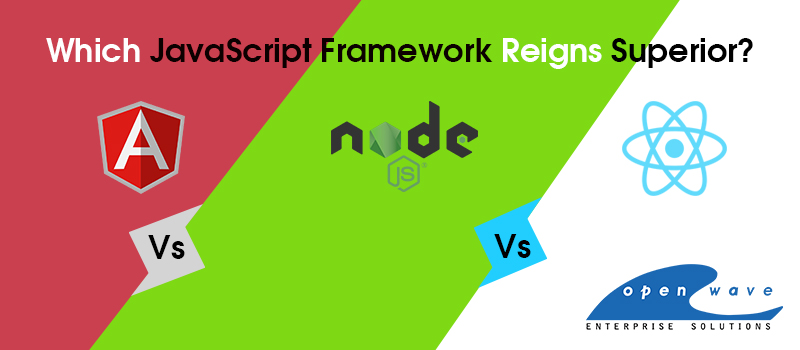Which is the Best JavaScript Framework for Web App Development?
Creating a web application has become a very essential requirement, and the increasing demand for this has created a lot of spike in the development market. The demand has grown so big that today people are faced with a variety of development choices; from Angular to Node, to React, JavaScript is piloting the web application development domain. While you might be spoilt for choice, picking the right web development platform can still be challenging.
Though versatile and efficient in their own manner, each of these JS frameworks comes with their own pros and cons. So depending on your requirement, the best preference will often vary.
AngularJS
A client-side framework initiated by Google, AngularJS development aims at making single page applications a seamless process. Having been in the field for a decade, this framework has amassed an amazing community of developers and comes with stellar levels of extensibility.
Here are a few reasons why Angular is a popular name in the web development market:
- Neat UI: The UI design aspect of Angular is definitive since it's done through HTML.
- Flexible: Data transformation and web development happens seamlessly on AngularJS.
- Easy Testing: Testing with mock data is a unique method Angular offers that's both convenient and effective.
Why You Should Use AngularJS:
- Testing is simple.
- Huge collection of libraries.
- Angular binding.
- Fantastic UI.
- Routing is easy.
- Data synchronization is automatic.
The Disadvantages of Using Angular JS:
- Debugging becomes difficult.
- Integrating third party apps is not simple.
- Routing is limited.
- Angular has a steep learning curve.
ReactJS
React is an open-source library more and a framework less. Used predominantly for building user interfaces, React relies a lot on the view aspect of the popular MVC architecture. Using ReactJS big datasets can be rendered easily.
Here's what makes React popular in the game:
- SEO-Friendly: Search engines are able to read JS apps made on React easily.
- Top-Tier Efficiency: The performance provided on ReactJS is unparalleled in terms of efficiency.
Why ReactJS is an Incredibly Viable Platform:
- Regular updates.
- Importing externally is easy.
- Allows for code reuse.
- Debugging is smooth on React.
- Learning is swift with its stellar API.
The Disadvantages of Using ReactJS:
- Integrating React into any MVC framework would be challenging.
- At the end of the day React is only a library.
NodeJS
Much like React, NodeJS isn't a framework, it is instead a server that is backed by the V8 JS engine. NodeJS development is used to execute JavaScript on the server end. It helps make complex development tasks simpler.
Here are 2 reasons why NodeJS works well in web development:
- NPM: Package management is seamless in NodeJS since it comes with the Node Package Manager.
- Server-End Proxy: NodeJS can handle multiple simultaneous connections without any hassle.
Why Employ NodeJS:
- Code sharing between client and server side.
- Learning is simple.
- Huge community.
- Streaming big files is seamless.
The Disadvantages of Using NodeJS:
- One processing unit isn't enough to efficiently work with NodeJS.
- JavaScript has to be known thoroughly to work with Node.
- Better suited for web servers rather than CPUs.
- Database issues.
Each of these frameworks has a number of advantages and disadvantages, and working with one ultimately depends on your requirement. To get the best web application development for your venture, reach out to Openwave - the top Web Application Development Company in Singapore! Our experts will provide your venture with a tailor-made web app and see that it takes off grandly. Call us now to get started!


no responses.